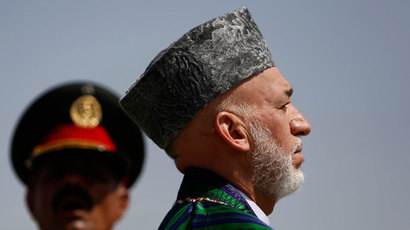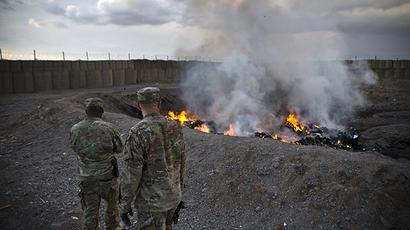US troops staying in Afghanistan after 2014 to get local justice immunity - draft pact
US forces that remain in Afghanistan after 2014 will be under the jurisdiction of the US and not be subject to Afghan courts, according to a draft security deal released by Kabul on Wednesday. The measure has been much-debated between the countries.
The Afghan foreign ministry stated that US forces would keep
“the exclusive right to exercise jurisdiction,” on its
website on Wednesday. The issue was one of many contentious
articles to be resolved before Afghan chiefs assemble on
Thursday.
“Afghanistan authorizes the United States to hold trials in
such cases, or take other disciplinary action, as appropriate, in
the territory of Afghanistan,” the text said. The new pact is
to last "until the end of 2024 and beyond" unless either
side terminates it.
US Secretary of State John Kerry confirmed the draft agreement,
but refused to give detail of the final wording of the document.
"We have reached an agreement as to the final language of the
bilateral security agreement that will be placed before the Loya
Jirga tomorrow," Kerry told reporters.
However, US State Department spokeswoman Jen Psaki said "there
continues to be" a discussion about the "final details and
the final language" in response to the Afghan Foreign
Ministry draft.
“We did not expect that every piece would be reflected in
whatever was initially posted. So we are reviewing the text with
that in mind and I would expect that there is still a more final
version to come,” she added.

On Tuesday, it was revealed that US forces would be allowed to
enter Afghan homes in “exceptional” circumstances, with
Aimal Faizi, a Karzai spokesman, stating that the notion of
“extraordinary circumstances” could not be misused.
The two countries are struggling to finalize a security pact before Thursday’s meeting of over 2,500 Afghan chiefs who will debate whether US troops will be permitted to stay in the country post-2014. The five-day long negotiations of the so-called Loya Jirga grand assembly began on Thursday.
Afghan President Hamid Karzai told the assembly of elders that President Barack Obama had sent a letter assuring him that a security pact between the two states was in Afghanistan’s best interest, Reuters reports.
Karzai said US troops would only enter local homes under exceptional circumstances, a request he was reluctant to grant and which drew out negotiations until late on Wednesday.
The legal status of American troops on the ground was the main
sticking point in the bilateral security agreement (BSA). If the
draft is approved by tribal elders it will then be presented to
the Afghan parliament for a vote.
Without such an accord, the US might have to pull out of
Afghanistan by the end of 2014.
'No Apology'
Kerry also stated that president Karzai did not ask Washington to
apologize for war mistakes, and there was no discussion of an
apology.
"The important thing for people to understand is there has
never been a discussion of or the word 'apology' used in our
discussions whatsoever," Kerry told reporters, pointing out
the Afghan President had not asked for an apology.
"Let me be clear President Karzai didn't ask for an apology.
There was no discussion of an apology. There will - there is no
- I mean, it's not even
on the table. He didn't ask for it, we're not discussing it,"
Kerry said.

On Tuesday the Afghan government announced that it was expecting
a letter from President Obama acknowledging US mistakes made
during the war. However, the US administration did not confirm
that it had agreed to such a dispatch.
National Security Adviser Susan Rice denied that such a request
even existed claiming she had no idea where the reports were
coming from.
"No such letter has been drafted or delivered. There is not a
need for the United States to apologize to Afghanistan," Rice
said on CNN's Situation Room.
"Quite the contrary, we have sacrificed and supported them in
their democratic progress and in tackling the insurgents and al
Qaeda. So that (letter of apology) is not on the table," Rice
said.
On Wednesday the State Department spokeswoman hinted of the
possibility of issuing a separate communique to the Afghan
government confirming US commitment to peace and “addressing
past issues.”
“The secretary offered the idea of providing the same
reassurances about our security relationship and addressing past
issues, such as civilian casualties, which we’ve talked about
many times in the past, in some format,” Psaki said.
At the same time she acknowledged that no apology letter was
requested by the Afghan government. “Nobody asked for an
apology,” Psaki said, adding that reports of such were
“perhaps a game of telephone.”














